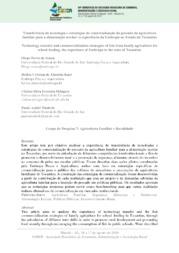Family farming project awarded by UN agency
Family farming project awarded by UN agency
An article about the project "Technology transfer to insert fish produced by family farmers in school meals" was awarded by the United Nations agency International Fund for Agricultural Development (IFAD)'s Mercosur Regional Program. The report on the experience with public schools and fishers in Brejinho de Nazaré (Tocantins, Brazil) was an one of the five chosen for publication on their web page and for a US$250 prize.
At the beginning of the year, the Federal University of Rio Grande do Sul (UFRGS) Family Farming and Rural Development Research and Study Group (GEPAD), IFAD's partner, issued a call with the aim of selecting the best experiences with family farming. The result was publicized last April.
Diego Sousa, a technology transfer analyst at Embrapa Fisheries and Aquaculture and one of the authors of the article, celebrated the result. “For me, this award is the recognition of the importance of Embrapa's work with family farmer audiences”, he asserts. The analyst Hellen Christina de Almeida Kato, another author of the article and currently responsible for the project, was also thrilled. “This prize was important as it is an international body's acknowledgement of the success of our experience. It is not only about the award in itself, but it gives the work publicity and the opportunity so that the seed we sowed here in Tocantins can bear fruit in many other places”, she commented.
Fish for schools
The awarded project has benefited fishermen in Brejinho de Nazaré, a village with less than 5,000 inhabitants 115 km away from the capital of Tocantins, Palmas. They experienced a significant increase in income thanks to the initiative. The idea is to make the link between artisanal fishing and catering in the public education sector", informs Hellen Kato. In total, 15 fishermen were paid R$ 81,026.61 in approximately four months of tests.
In 2016 there was the implementation of the pilot project, which consisted in training fishermen in best practices and advise them so that they could participate in the National School Meals Program (PNAE). Out of the 36 workers who participated in the project, 15 were able to fulfill the program requirements and were compensated.
The PNAE determines that the states and the cities use at least 30% of the funds allocated from the National Education Development Fund (FNDE) to purchase Family Farming products for school meals. “For the fishermen it is an excellent business, as they already have a buyer. However, it is necessary that these workers have all their documentation updated and adopt best practices to be able to sell their product in institutional markets”, explains the analyst.
Vanaldo Bispo dos Santos, president of the Brejinho settlement with 42 fishermen, approved the project. “We are optimistic with this new door that opens, through which each fisherman has the chance to generate income and improve their lives, because production has destination", he celebrates.
For the four months of the pilot project, they produced 5,884 kg of mechanically deboned fish, most of which was donated to social institutions, such as daycare centers, shelters, support houses, the Palmas General Hospital, among others. Two public schools under the city government in Palmas were also included. Mesa Brasil, a program by the Trade Social Service (Sesc) and one of the project partners, was in charge of making the distribution.
During the fish processing, the deboner separates the meat from pin bones, resulting in a product that is similar to minced meat. To work with such fish meat - not common in school meals - caterers were trained in preparation and best practices. “We faced some resistance among the cooks, while others embraced it. Inasmuch as the main hurdle to introducing fish to school meals, which is the presence of pin bones, has been solved, our target now is to obtain adherence in more schools”, it concludes Hellen.
Other project partners are: National Supply Company (Conab), Tocantins State Rural Development Institute (Ruraltins), Tocantins State Education Secretariat (Seduc), Ministry of Agriculture, Livestock, and Food Supply (MAPA), Mesa Brasil – Trade Social Service (Sesc), and the Brazilian Micro and Small Business Support Service (Sebrae).
Translation: Mariana Medeiros
Elisângela Santos (19.500/ MTb - RJ)
Embrapa Fisheries and Aquaculture
pesca-e-aquicultura.imprensa@embrapa.br
Phone number: +55 63 3229 7834
Further information on the topic
Citizen Attention Service (SAC)
www.embrapa.br/contact-us/sac/


